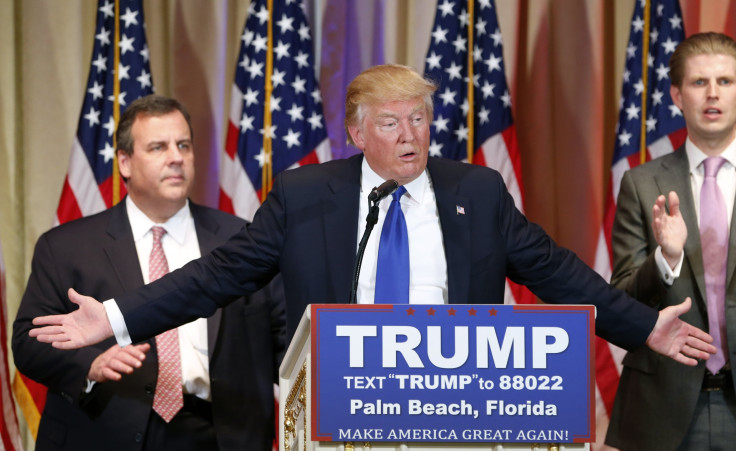US Presidential election 2016 odds: Donald Trump steps closer to White House after billionaire attack ads dropped

Donald Trump’s bid to be the next President of the United States could have taken another leap forward with the announcement that an expected anti-Trump advertising campaign will not be financed by two of the wealthiest conservative donors in America.
The Koch brothers, billionaire businessmen who regularly pump millions into conservative think-tanks and organisations, will not fund a previously expected US$400 million (AU$547 million) into ads targeting Republican nominee front-runner Donald Trump.
James Davis, a spokesman for Freedom Partners -- a non-profit organisation partially funded by the Koch brothers -- denied any involvement in political advertising would take place, according to Reuters.
“We have no plans to get involved in the primary,” Davis said.
There were media reports in January that an anti-Trump advertising onslaught would be financed by the brothers with the aim of derailing Trump's bid for the Republican nomination. The Koch brothers, industrialists known for their financial support to conservative political organisations, own 84 percent of Koch Industries, believed to be the second-wealthiest privately owned business in the US.
Trump -- who was victorious in Georgia, Arkansas, Virginia, Vermont, Massachusetts, Tennessee and Alabama on so-called Super Tuesday -- has emerged as the favourite for the Republican nomination for November’s US Presidential Elections. His popularity amongst voters across diverse areas of the US in the primaries has sent tidal waves through the Republican party and triggered much soul-searching among its members, who are concerned his divisive rhetoric will result in certain defeat to the Democratic Party’s candidate in the November election.
Trump has positioned himself as the anti-establishment figure during the campaign, and has been vocal in his criticism of Republican stalwarts.
His remarks about Mexicans, Muslims and China have been widely regarded as racist and many Republicans are dismayed at the direction in which Trump has taken their party.
A refusal to wholly rebuke former Klu Klux Klan leader David Duke in an interview on Sunday with CNN has drawn further criticism from across the political spectrum.
South Carolina Senator Lindsey Graham has even suggested rallying around Ted Cruz as an alternative to the real estate magnate, following Trump’s landslide victory on Super Tuesday.
“We may be in a position where we have to rally around Ted Cruz as the only way to stop Donald Trump,” Senator Graham said in an interview with TV host Charlie Rose.
Graham’s animosity to Cruz is well documented, and his proposal to support the Texan candidate demonstrates the depth of anti-Trump sentiment within the GOP.
Former Republican Presidential candidate Mitt Romney, who was defeated in the 2012 Election by Barack Obama, will on Thursday make a speech on the nature of the 2016 race where he is also expected to criticise Mr Trump.
Despite admonishments from Republican and conservative grandees, the controversial Trump is the now the clear favourite to be the Republican candidate in the US election this November, with a Hillary Clinton vs. Donald Trump showdown for the Presidency looking increasingly likely.
Ben Carson, a retired neurosurgeon who once led the Republican polls, dropped out of the running on Wednesday, declaring he saw no “political path forward” after the results of Tuesday night. However, he has refrained from withdrawing completely.




















